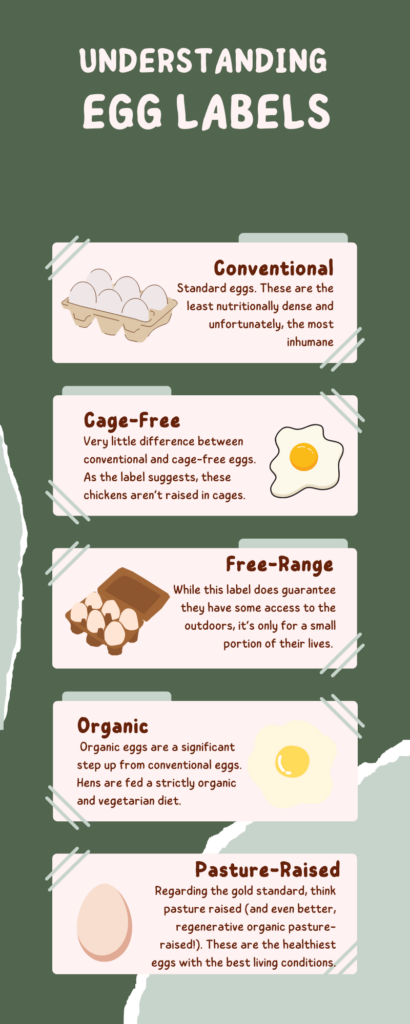You’re likely to be confused when you browse the egg aisle at your local grocer. What does each label mean? Is there one kind of egg that is better for scrambling or baking? Are egg whites healthier than an egg with yolk? Pasture-raised eggs vs. organic vs. pasture-raised organic vs. restorative vs. true blue heirloom eggs? Fear not. Today, we’re breaking down how to buy the healthiest eggs and what egg labels actually mean. Based on nutritional value (and farm conditions), we’ll uncover which eggs are worth the splurge. Although egg prices have increased in recent years, they still run the gamut; they can easily be a part of a nourishing diet—especially on a budget. Time to get cracking.

Are eggs healthy?
If you aren’t allergic (and choose to eat them), eggs are a fantastic source of vitamins A, D, B12, and choline. Choline is an essential nutrient for a healthy metabolism, pregnancy, and child development. They’re also an affordable source of protein. Although naturally high in cholesterol, the cholesterol in eggs doesn’t seem to raise cholesterol levels. Research shows that eggs actually increase HDL (good) cholesterol. In fact, in a study with over 170,000 people, researchers found no significant associations between egg intake and cholesterol levels, death rates, or major cardiovascular disease events.
Health Benefits of Eggs
Before we dive into pasture-raised eggs vs organic, let’s break down their benefits further.
1. Complete source of protein
Did you know that one egg has approximately six grams of protein, with all nine essential amino acids? These are the building blocks of protein. Scrambled, poached, whipped into a frittata, or added to a salad, they’re a convenient source of satiating protein. For this reason, I typically meal prep hard-boiled eggs for the week.
2. Nutrient-dense
Eggs have more nutrients (vitamins, minerals, etc.) per calorie than most other foods! Along with protein, you’ll get healthy fats, vitamin B12, choline, selenium, and more. Oh, and don’t just eat the egg white. The egg yolk is rich in all the good stuff.
3. Blood sugar-friendly
Protein-rich foods—like eggs—can play an important role in regulating blood sugar levels. And this is key for sustained energy, satiation (feeling full), and improving sleep. I wear a continuous glucose monitor, and eggs don’t impact my blood sugar! They’re my go-to snack or lunch, paired with complex carbs.
4. support eye health
Antioxidants help prevent certain eye diseases, like cataracts and age-related macular degeneration. Green leafy vegetables have them (spinach, kale, etc.), but eggs are an even better source. The reason is that the yolk’s fat makes it easier for your body to use the nutrients.
5. Sharpen brain
That’s right. And if you’re pregnant or nursing, eggs can support the development of your growing baby’s brain! Eggs contain choline, which helps your brain’s nerve cells communicate with each other. Choline is also a crucial nutrient for pregnant and breastfeeding women.

What determines eggshell color?
Egg shell color is determined by the hen’s genetics. Their breed will ultimately tell you the color of her eggs. Most often, white hens lay white-shelled eggs, and brown hens lay brown-shelled eggs. Eggs with deposited pigments (i.e., a blue hue) are a result of the hen’s oviduct—where the shell is formed. Surprisingly, all eggshells start out white! Then, their shell transforms colors. Regardless of color, the egg’s shell color has no major bearing on nutritional content or taste.
What determines egg Yolk color?
The color of egg yolk will vary depending on the chickens’ diet. Egg yolks can typically range in color from pale yellow to deep orange; surprisingly, the color does not indicate the nutritional value or quality of the egg. Typically, the color of the yolk is determined by the pigments consumed in the egg diet. Hens fed a predominately grain-based diet tend to have a more pale egg where, whereas hen diets that are richer in corn and soy and hens that roam farms tend to have a darker yolk due to the varied and increased nutrients in their diet.
How are eggs graded?
In the United States, consumer grades for eggs are either AA, A, or B. Grade AA eggs should have a thick, firm egg white and a clear anchor between the egg and the yolk. The yolk should be round and high. These eggs are ideal for all kinds of cooking, but especially for poaching and frying. Eggs of this grade are full and regularly shaped. Grade A is very similar to AA—however, the whites may be slightly less firm and less thick. Same as AA, they can be used in various recipes, including baked goods. Grade B eggs have a thin, flat yolk. They’re included in frozen or freeze-dried egg products.

Understanding different egg labels
These days, there are just as many carton labels as there are nutrients in eggs. Starting from least optimal to most optimal (health-wise and living conditions of the chickens). Spoiler alert: when it comes to pasture-raised eggs vs. organic, pasture-raised is won.
Conventional
These are standard eggs. These often have no special label and come from chickens raised in large commercial farms. Their wings and beaks are often clipped and kept in small cages on top of one another. Due to these living conditions—and the fact that they come from commercial farms—these eggs are the most affordable. However, these are the least nutritionally dense and, unfortunately, the most inhumane.
Cage-Free
Truthfully, there’s very little difference between conventional and cage-free eggs. These chickens still get their beaks and wings clipped and live in close quarters—with minimal sunlight and no guaranteed access to nature. The only major difference? As the label suggests, these chickens aren’t raised in cages.
Free-Range
When you think of free-range, do you envision chickens roaming in grassy fields all day? If so, think again. While this label does guarantee they have some access to the outdoors, it’s only for a small portion of their lives. Unfortunately, free-range is a blanket term. The amount of time (and quantity of space outdoors) can vary.
Organic
Also labeled as “organic vegetarian-fed,” certified organic eggs are produced via chickens fed a strictly organic and vegetarian diet. The vegetarian-fed label may have a certain appeal, but it doesn’t necessarily mean the egg is more nutritious. That said, organic eggs are a significant step up from conventional eggs.
Pasture-Raised
Regarding the gold standard, think pasture-raised (and even better, regenerative organic pasture-raised!). These are the healthiest eggs, and they have the best living conditions. These eggs come straight from hens raised on a pasture, which typically indicates that they could freely roam with full access to sunlight. These chickens eat an organic diet with bugs, worms, and grasses. Their yolks are more nutritious, including twice as many omega-3 fatty acids and a deeper orange color.
To summarize, the best eggs are pasture-raised organic, USDA AA or A, and stamped with the Certified Humane or Animal Welfare Approval seal.

Where can you find local eggs?
Need your egg fix? Want to support a local farm? Take to Farmish or Local Hens. Supporting your local farmers through a CSA box is another way to find economical eggs!
This article is for informational purposes only. It is not, nor is it intended to be, a substitute for professional medical advice, diagnosis, or treatment, and we recommend that you always consult with your healthcare provider.




Leave a Reply